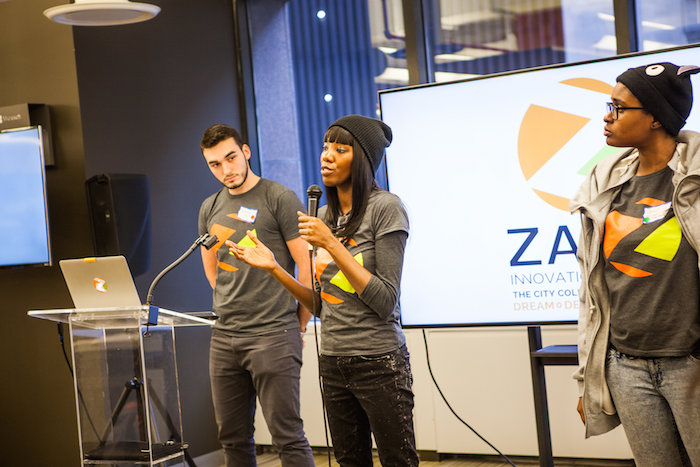Katherine Olives

Have you ever felt that you werent worthy of being where you are today? That for whatever reason–be it your age, your ethnicity, your race, your gender, your sexual orientation, or where you came from–you werent supposed to be succeeding? It might sound crazy, but a lot of people, especially young people, suffer this form of self-doubt. And it can be detrimental to their future.
In our next Meet a CCNY Startup interview, Id like to introduce you to Interveen, a competitor in the Standard Chartered Women+Tech4NYC track. Interveen is building a platform to help at-risk students manage stress and develop care, resilience, and healthy mindsets so that they graduate. Interveen is led by Sharese Mullan, a senior psychology major, and her team includes Jennifer Lafosse, a senior art studio major; Ono George, a recent grad with a degree in psychology, Leutrim Cahani, a mechanical engineering student; and Eric Tung,a chemical engineering student. You can meet them at Demo Day on May 1st, but in this special interview, Sharese tells why shes so passionate about this problem.
The Zahn Center: I remember first reading your application to the Zahn Center and thinking, what an interesting problem. What led you to it?
Sharese Mullan: I read the New York Times article Who Gets to Graduate? by Paul Tough in my Market Research class. The article focused on student dropout rates and the underlying causes. The single indicator of retention turned out to be the parents income, and it was found that students on the lower side of the socioeconomic status scale lacked traits that were necessary for success and degree completion.
ZC: Traits? Like what?
SM: The study found these students lacked skills centered around mindset. It was all about what students thought about their abilities, their sense of belonging on campus, and how they viewed their own intellect. They also lacked resilience–or how likely someone is to stay on track in the face of a failure or setback. Its something Im definitely familiar with, but I didnt know so many young people suffer from it.
ZC: But youre so focused–you seem like a born leader. Youre telling me you struggled with the same type of mindset?
SM: After I graduated high school, I didnt believe I had the ability to be successful in the areas I was most interested in, and I limited myself. When I completed culinary school, I left a job at a five star restaurant after only a half-day because I didnt believe I was skilled enough to work there.
ZC: Oh wow, I would have never guessed.
SM: Whats so incredible is that these mentalities can perpetuate themselves throughout a persons life-cycle and sabotage their efforts at success or realizing goals. I struggled with these mindsets a decade later when I began City College. Luckily, I sought help this time around and developed strong mentor relationships. In the process though, my GPA dropped from 4.0 to 3.7 because, out of fear of failing and proving myself inadequate, I kept dropping classes or performing below my abilities in subjects I was most interested in.
ZC: I think so many students face that pressure, or fear of failure. Is there a word for this type of mindset?
SM: Its called Faulty Lay Theory. It pretty much causes self-sabotaging behaviors. Im most passionate about helping other students correct how they think about their capabilities and potential so that they can build resilience, and fight these thoughts that cause them to experience self-doubt.
ZC: So youre tackling a mental health problem? And one thats definitely under the radar.
SM: Were still figuring out what Interveen is. Right now, were focusing on the problem, and trying to figure out what the best solution is. Ultimately, we want to develop a platform that builds community and support amongst at-risk students.
ZC: Well isnt that what entrepreneurship is? For readers who arent part of our program, were all about the saying: Fall in love with the problem, not the solution. It seems like you've adopted that mindset!
SM: Haha, Interveen is definitely in love with the problem. So far weve found out that students are mostly stressed about school work (or its the one thing they admit to being stressed about). We've also found that teachers are very open to curriculum that addresses mental health, but theyre dissatisfied with current school systems and structures that support mental health.
ZC: It sounds like your team is doing a lot of customer interviews! What else are you all working on?
SM: For sure! Right now, were splitting up the duties of collecting interviews; Ono is handling research; Eric and Jennifer are conducting product research; and Leutrim is our social media guru, he'll handle marketing.
ZC: Sounds like you have a pretty stacked team backing this initiative. Do you think its the winning team?
SM: Well I hope we win the competition! We want to win for everyone who thinks they cant win. I spent a decade hiding from trying new things, and winning would empower me to help deter others from making that same choice.
ZC: Your team is truly and inspiration for young people who don't think they can succeed. I can't wait to find out how Interveen develops.
To meet Sharese and the rest of the Interveen team, visit them on Demo Day & follow them on social media @interveennyc.